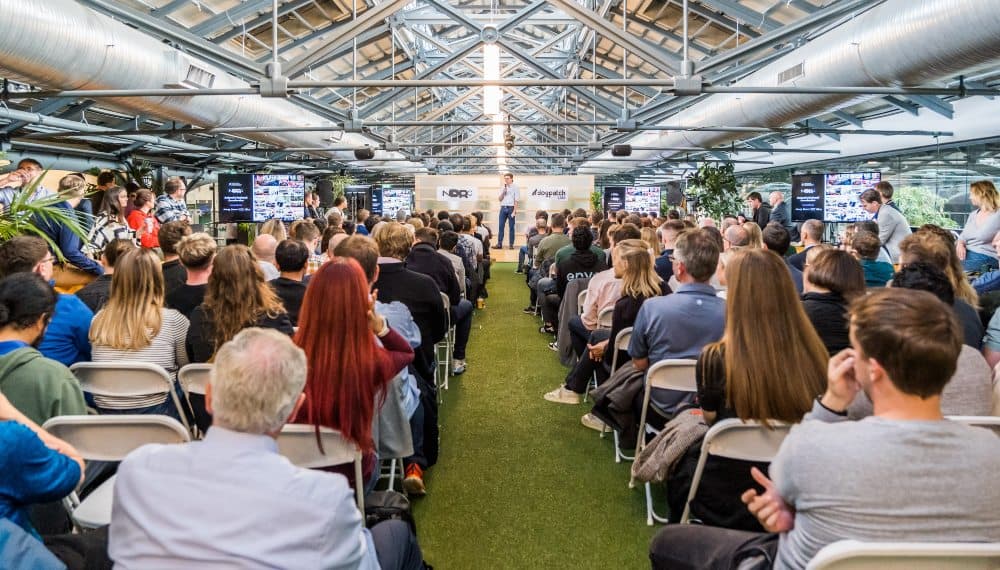The closure of the NDRC signals that a constellation approach to start-up accelerators needs to be taken by the Irish Government, urges Eoghan Powell from WorkIQ.
It was recently announced that the Government is discontinuing funding for the NDRC (National Digital Research Centre).
There’s been significant debate in the Irish start-up scene about the NDRC over the years, but one thing that can’t be denied is that at a point in time when the country relies on the tax receipts of a tiny number of multinationals, we need to rebalance our economy.
“We like to think of ourselves as a ‘Tech Hub’, but we aren’t a start-up nation. We are in fact a nursery for multinationals”
This was always going to be the case, but with Donald Trump returning to power in January this is now an existential crisis.
The most recent NDRC contract cost the State €17m over five years. Reports have indicated that this was broken down into €2.3m in operating costs and €1.1m invested directly into start-ups. And the results, by all accounts, were pretty good.
But in addition to the direct impact of the NDRC itself, we also need to consider the impact of this news just after we’ve had the Draghi report which says Europe needs to invest trillions in this space.
France has already turned itself into a ‘Startup Nation’, Italy has just announced a series of significant measures to improve supports for early stage companies, Estonia is becoming a powerhouse and, unfortunately for us, Ireland is moving backwards.
We like to think of ourselves as a ‘Tech hub’, but we aren’t a start-up nation. We are in fact a nursery for multinationals. We have bred a generation of world class talent and locked them up in corporate creches. Our best and brightest are economic hostages, golden-handcuffed to comfortable salaries where their main focus is to direct workflows to improve efficiency.
Entrepreneurs are our future
What we don’t need is a replacement for NDRC. We actually need 10 of them. We need to encourage people to take chances, and try new approaches.
We can’t just keep cloning Y Combinator and expecting that we will create another Stripe. We have to find a way to encourage hardware companies, quantum and neuromorphic compute, modular reactors, graphene, orbital logistics and other weird edge technologies that might not work out, as well as B2B SaaS, FinTech and AI.
Just as the VC approach is to seed 10 companies with the view that one will become huge, we need to take a similar approach to accelerators. Imagine well-funded accelerators focused specifically on climate change, or drones, or social justice, or housing or whatever some group gets together and advocates for in a compelling way.
But above all we have to avoid the temptation to put all this into the hands of a single agency. We need a variety of approaches. We need to encourage the odd ideas, and the fringe. Just think about it logically, Airbnb was a terrible idea. Until it wasn’t. Today’s weird idea might be tomorrow’s game changer.
We need programmes run by Enterprise Ireland, and the private sector, and charities, and Universities. Every one of them has their Pro’s and Con’s. But by taking a constellation approach, we give ourselves the chance to have our cake and eat it. And we mitigate the chances of groupthink.
At some point, we are going to need to replace what we currently get from Apple, Pfzier, Microsoft and Novonordisk. This doesn’t mean we have to get rid of those companies, or stop supporting them. I’m pretty confident the leaders of every one of those businesses would get on board with this agenda.
Now is the time for budding entrepreneurs to build their own life raft. Think of your side project. Can you figure out how to get it to a point where it could pay your mortgage? Think of your paycheck as your seed investor.
Don’t have an idea, don’t have all the skills, don’t have the time/money/contacts to get something off the ground on your own? Start hanging out with startup folks. Go to meetups, drink bad coffee at events, chat on LinkedIn. There’s a more than decent chance that you’ve got skills, knowledge, resources that someone else needs. Be a helpful part of the community and you will be amazed at what where it can take you. Even if it doesn’t take you somewhere, you could unlock something for someone else. Pay it forward.
Following the elections, ask the new cabinet and TDs what they plan to do to encourage more Irish rooted businesses. We can’t even say we are just going to keep doing what’s been working, because that just got switched off. Demand we do better. The next wave of jobs depend on this.
And politicians, meanwhile, need to look at EIIS (Employment Investment Incentive Scheme) schemes, look at what we can do to even the playing field to encourage talent to move to our own startups, and look at the whole area of employee shares from options to Employee Ownership Trusts.
WorkIQ and hubs like us aren’t really in competition with each other, we are all engaged in the same battle. We all want to see great companies emerge from Ireland. Our real competition is people not starting new companies and this announcement doesn’t help. This is a fork in the road moment, let’s not waste it.






